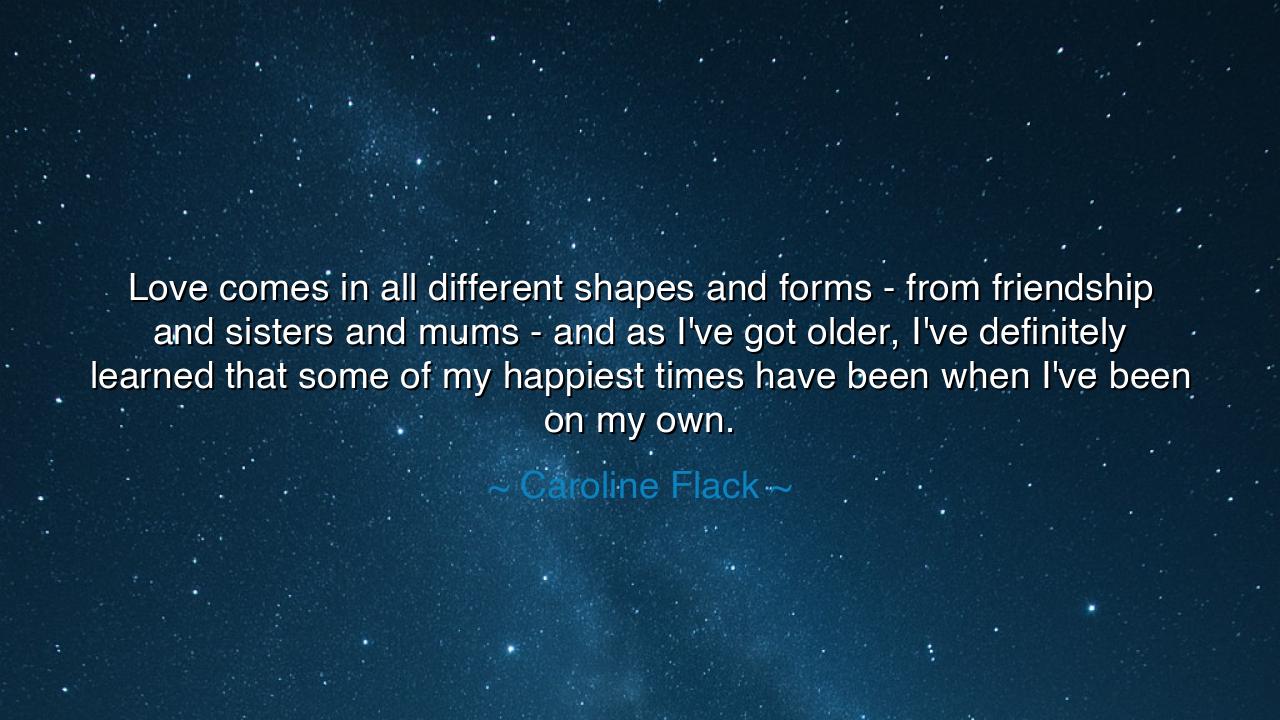
Love comes in all different shapes and forms - from friendship
Love comes in all different shapes and forms - from friendship and sisters and mums - and as I've got older, I've definitely learned that some of my happiest times have been when I've been on my own.






In the tender words of Caroline Flack, we find a truth both gentle and profound: “Love comes in all different shapes and forms — from friendship and sisters and mums — and as I’ve got older, I’ve definitely learned that some of my happiest times have been when I’ve been on my own.” This saying, though born of modern lips, carries the timeless voice of wisdom. It reminds us that love is not a single flame bound to romance, but a great constellation of lights — familial, platonic, and solitary — all shining differently, yet all divine. The ancients would have nodded at this revelation, for they too knew that the heart’s capacity for affection is vast, and that to love well, one must also learn the holy art of being alone.
For too long, the world has mistaken love for possession — a bond that demands two and excludes solitude. Yet Caroline’s words awaken us to a wider understanding: that love is not merely the joining of hearts, but the presence of compassion, whether between souls or within oneself. The ancients spoke of agape, philia, and storge — love as friendship, love as kinship, love as devotion — each a different thread in the tapestry of the human spirit. Caroline’s reflection restores this forgotten harmony. She teaches that joy can be found not only in union but in independence; not only in embrace but in self-contentment.
Think, for instance, of Marcus Aurelius, the philosopher-emperor who ruled Rome yet found his deepest peace in solitude. Surrounded by power, glory, and adoration, he still turned inward for strength. “Nowhere can man find a quieter or more untroubled retreat than in his own soul,” he wrote. Like Caroline, he understood that love does not vanish when we are alone — it transforms. It becomes self-love, acceptance, and the serenity of knowing one’s worth without needing witness or applause. To be alone, and yet unlonely — that is a triumph few achieve, and those who do live as free as kings.
Caroline’s words also whisper of maturity — the slow unfolding of the heart’s understanding through the seasons of life. In youth, we chase love as if it were a prize; we crave validation through another’s gaze. But with time comes wisdom: we learn that the richest loves are often the quietest — the laughter shared with a friend, the gentle care of a mother, the peace found in one’s own company. Such love does not burn wildly; it glows steadily, nourishing the spirit instead of consuming it. Growing older, as Caroline says, means learning to find joy not in constant attachment, but in balanced affection and inner harmony.
Yet there is a poignancy in her reflection too, for Caroline Flack’s life was not without sorrow. A woman celebrated by many and yet haunted by the gaze of the world, she reminds us that even those surrounded by affection may still feel unseen. Her words, therefore, are not mere sentiment — they are a plea for understanding: that solitude is not a void, but a refuge. In being alone, she found moments of genuine happiness — not in absence of love, but in its purest form: self-companionship, unclouded by expectation. From her experience, we inherit a lesson in both joy and fragility — that to love oneself deeply is an act of courage in a world that constantly seeks to define us through others.
There is an ancient balance in this truth: to give love freely, and yet not lose oneself in the giving. The wise must learn to hold affection in open hands — to cherish family, to honor friendship, to nurture connection — but also to guard the inner sanctuary where peace is born. For if we depend wholly upon others for our happiness, we become beggars of the heart; but if we cultivate love within, we become fountains, overflowing with kindness to all around us. This is the art of complete living — to love without clinging, to give without losing, to be alone without despair.
And so, the lesson that flows from Caroline Flack’s words is this: seek love in all its forms, but never forget the one that begins within. Embrace your family, your friends, your community — but also learn to sit in stillness and call yourself beloved. Take time to walk alone beneath the stars, to breathe without hurry, to listen to the quiet music of your soul. In that stillness, you will find not absence, but abundance. For the heart that knows self-love becomes a vessel vast enough to hold every other kind.
Thus, let her message echo through the ages: love wears many faces — the hand of a friend, the care of a mother, the calm of solitude. To live wisely is to honor them all. And when the world grows loud and restless, may you remember her truth — that some of the happiest times of your life may be those when you stand alone, yet surrounded by the unseen arms of every love you have ever known.






AAdministratorAdministrator
Welcome, honored guests. Please leave a comment, we will respond soon